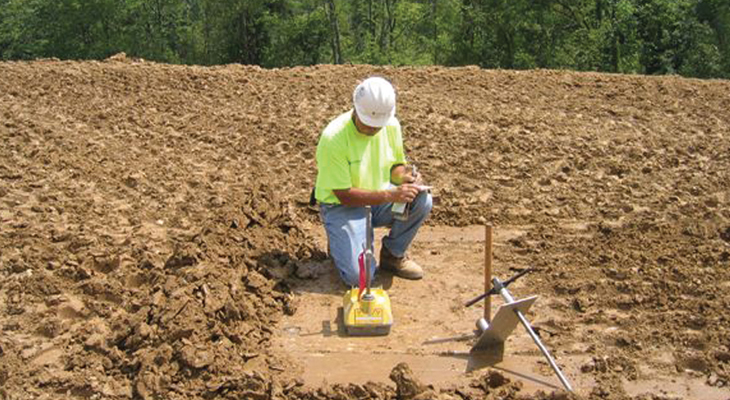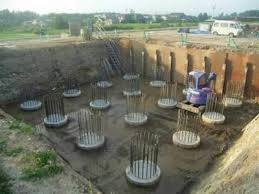A Comprehensive Guide: All About Geotechnical Engineering and Its Applications
The Importance of Geotechnical Design in Dealing With Environmental Obstacles and Enhancing Building And Construction Safety
Geotechnical design serves as a foundation in the junction of environmental stewardship and building safety, supplying important understandings right into the actions of dirt and rock under different problems. By applying critical website investigations and tailored mitigation procedures, geotechnical designers play an important duty in protecting both human lives and ecological integrity.

Function of Geotechnical Design
Geotechnical design plays an important role in the design and construction of infrastructure by resolving the behavior of soil and rock products under different problems. This area of engineering is essential for recognizing the communication in between frameworks and the ground, that includes determining the load-bearing capacity of dirt, assessing stability, and forecasting possible settlement or failing.
Geotechnical engineers are accountable for performing site investigations, which entail sampling and screening soil and rock to collect information on their chemical and physical properties. This info is vital for developing foundations, retaining walls, and various other earth-retaining frameworks that ensure safety and long life. Furthermore, geotechnical design educates the choice of suitable construction methods and products, consequently lessening threats connected with dirt behavior.
Moreover, the integration of geotechnical design principles into urban preparation and environmental administration is crucial for resolving difficulties such as ground contamination and groundwater monitoring. By recognizing geotechnical elements, engineers can establish sustainable options that boost the strength of facilities against all-natural risks, while also advertising ecological stewardship. Eventually, the function of geotechnical engineering is important for attaining risk-free, resilient, and ecologically aware building practices.
Dirt Disintegration Reduction
Soil disintegration postures a considerable danger to both environmental security and framework honesty, influencing about 24 billion lots of abundant soil lost yearly worldwide. This sensation is exacerbated by aspects such as deforestation, urbanization, and inadequate agricultural practices. Geotechnical design plays a critical duty in developing effective soil erosion reduction approaches that secure both the environment and building jobs.
One approach involves the implementation of disintegration control approaches such as greenery growing, which maintains dirt through origin systems. Furthermore, the construction of preserving walls and terraces can successfully minimize surface area drainage and protect susceptible areas from disintegration. Proper drainage layout is likewise essential; it lessens water accumulation and routes excess runoff away from important structures.
In addition, geotechnical engineers utilize dirt stablizing techniques, such as the application of geotextiles and biodegradable floor coverings, to enhance soil communication and stop destruction - geotechnical companies in south africa. Normal monitoring and evaluation of erosion-prone websites enable prompt interventions, making sure long-lasting sustainability. By integrating these approaches, geotechnical design not only mitigates the impacts of dirt erosion yet likewise adds to the strength of facilities versus environmental difficulties, eventually promoting a safer and a lot more lasting constructed atmosphere
Groundwater Defense Strategies
Groundwater serves as a crucial resource for drinking water, farming, and commercial procedures, making its defense important for environmental sustainability and public wellness. Reliable groundwater defense techniques are vital in mitigating contamination risks and making sure the durability of this source.

Routine monitoring of groundwater top quality is also vital, enabling very early detection of contamination resources and helping with prompt remediation initiatives. Using innovative technologies, such as geophysical studies and remote picking up, aids in identifying possible hazards to groundwater gets.
Furthermore, public education and learning and stakeholder engagement are critical, cultivating community assistance for groundwater security efforts. geotechnical companies in south africa. By incorporating regulative procedures, technological advancements, and neighborhood involvement, we can develop an extensive framework that safeguards groundwater resources while advertising sustainable advancement and building practices
Landslide Threat Monitoring
Landslides pose substantial dangers to both human safety and security and facilities, making efficient threat administration strategies important. Geotechnical engineering plays a crucial duty in determining, assessing, and mitigating landslide dangers. An extensive understanding of incline stability, dirt auto mechanics, and hydrology is vital for developing effective danger administration plans.
The very first step in landslide threat management includes complete website investigations, that include geological mapping and dirt screening. These investigations help engineers assess the possibility for landslides by other recognizing crucial aspects such as slope angles, dirt make-up, and water web content. Making use of advanced modern technologies such as remote noticing and geophysical studies can boost the accuracy of these evaluations.
Once risks are determined, suitable reduction measures can be implemented. These may consist of design remedies such as retaining wall surfaces, drainage systems, and incline stabilization techniques. Keeping track of systems need to be developed to detect indications of ground movement and adjustments in water levels, permitting for aggressive interventions.

Enhancing Construction Safety And Security
Construction websites commonly offer a myriad of dangers that can jeopardize employee safety and security and job integrity. Geotechnical engineering plays an essential role in enhancing building and construction safety by giving essential insights into subsurface problems. Through comprehensive soil and rock evaluation, geotechnical engineers can identify potential risks, such as soil instability, groundwater problems, and seismic vulnerabilities, click here for info which might compromise the security of building tasks.
Carrying out geotechnical options, such as correct structure layout and the use of retaining structures, reduces these threats considerably. These options not just make certain the security of the frameworks being developed but also produce a safer working environment for building and construction personnel.
Moreover, cultivating a society of safety and security with training and adherence to established safety and security methods further enhances construction site safety. By incorporating geotechnical competence right into the planning and implementation stages, building and construction jobs can accomplish greater safety criteria, eventually protecting employees and guaranteeing successful project conclusion.
Conclusion
To conclude, geotechnical engineering functions as an important technique in dealing with environmental obstacles and promoting building safety and security. With effective soil disintegration reduction, groundwater protection techniques, and landslide risk administration, geotechnical designers contribute to the growth of durable infrastructure. The assimilation of these practices promotes a much safer building atmosphere and enhances the sustainability of civil engineering jobs. Eventually, the expertise of geotechnical designers is indispensable in safeguarding both natural deposits and human lives versus potential threats.
Geotechnical design serves as a keystone in the intersection of environmental stewardship and building safety and security, offering vital site understandings into the behavior of soil and rock under different conditions. Geotechnical engineering notifies the option of appropriate building techniques and products, thereby reducing dangers associated with soil habits.
Geotechnical engineering plays a crucial function in creating effective soil disintegration reduction strategies that guard both the environment and building tasks.
Additionally, geotechnical engineers employ dirt stablizing methods, such as the application of geotextiles and biodegradable floor coverings, to boost dirt cohesion and protect against destruction. Through thorough soil and rock analysis, geotechnical engineers can determine prospective threats, such as dirt instability, groundwater issues, and seismic susceptabilities, which may endanger the safety and security of building tasks.